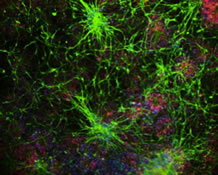Columbia University
Irving Medical Center
Neurological Institute
710 West 168th Street, 3rd floor
(212) 305-1818
About Us
Taub Faculty
Research Summary:
After graduating from the University of Buenos Aires, Argentina, with a B. Sc. in Biology and Molecular Genetics, Dr. Berman began an MSc/PhD program at the Department of Neurobiology of The Weizmann Institute of Science in Israel under the supervision of Prof. Yadin Dudai. Dr. Berman's PhD thesis focused on the molecular mechanisms of memory consolidation, retrieval, and extinction in the mammalian brain. His work helped unveil the different intracellular signaling cascades that cortical neurons utilize to store and modify memory traces. Upon completing his PhD, Dr. Berman became a Postdoctoral Research Fellow at the Center for Neurobiology and Behavior at Columbia University. His previous experience studying the molecular bases of memory formation led him to develop an interest in the metabolic aspects of memory dysfunction. Dr. Berman joined the laboratory of Dr. Gilbert Di Paolo at the Taub Institute for Research on Alzheimer's Disease and the Aging Brain at Columbia University and began focusing his research on genetically-modified models to uncover novel metabolic pathways underlying Alzheimer's disease. As an Associate Research Scientist in the laboratory of Dr. Scott Small, Dr. Berman is currently using a combination of brain imaging techniques, genetically-modified mouse models and drug development tools to further understand the human pathophysiology of Alzheimer's disease.
Current Projects:
The lab's projects focus on the role of the retromer complex, a vital element of the intracellular protein trafficking machinery, in the etiology and pathophysiology of Alzheimer's Disease. The lab is developing novel genetic and pharmacological tools to further understand how retromer complex modulation in neurons contributes to the early pathological steps in the neurodegenerative process.


